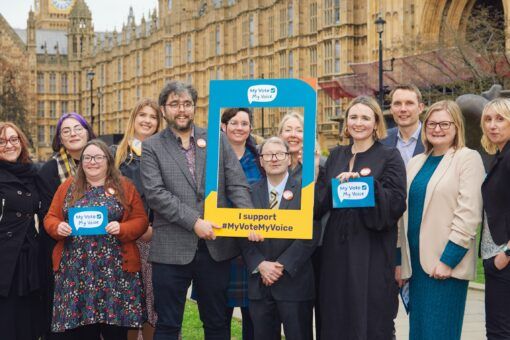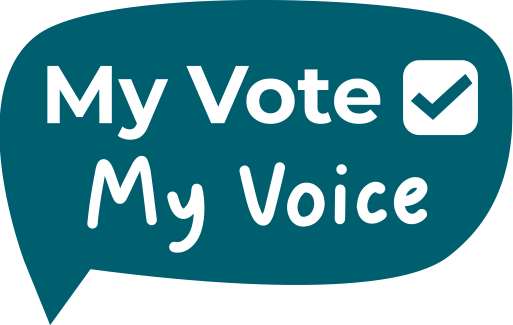#MyVoteMatters Petition Campaign Launched

My Vote My Voice have launched the #MyVoteMatters online petition campaign – calling on public representatives across Government and Opposition to make politics accessible for autistic people and people with learning disabilities.
Around 1.5 million people in the United Kingdom have a learning disability, and there are over 700,000 autistic people. But research by United Response in 2021 found that less than two-thirds of the general public know that they have an equal right to vote.
Although the UK has one of the highest election turnouts in the world, far too many people who want to vote can’t because our voting process simply does not meet their accessibility needs.
This is reflected in our political system, where disabled people remain underrepresented, struggle to directly engage in politics, and run for elected office. Just over 16% of elected representatives in local government have declared themselves as disabled. At Westminster, there are even fewer, where just five MPs out of 650 (less than 1%) are currently open about their disabilities.
This needs to change.
The #MyVoteMatters petition wants action on the democratic deficit facing our electoral and political systems.
We’re calling on:
- Government – to protect disabled people’s rights and entitlements to voting assistance.
- Parliament – to create more accessible pathways for disabled candidates to stand for national office.
- Politicians – to pledge to ensure their communication is accessible and understandable for all constituents, regardless of their needs.
It’s crucial that autistic people and people with learning disabilities are involved in politics – this could be a simple as casting a vote, but we need information about voting in accessible formats.
“People with learning disabilities like myself need support to understand information when it comes to voting; a lot of it is full of jargon. If it was accessible, then I don’t need that much support and I won’t need to rely to a second person to explain to me.“
“Representation also matters: we need more people with learning disabilities and autistic people in Parliament. If I saw more people like me working in politics, then I would think to myself I can do that too.
Ismail Kaji, My Vote My Voice campaign spokesperson and Mencap’s Parliamentary and Government Engagement Officer
Accessible voting is important for people to have a voice and to tell their MPs what they would like them to do for them in their constituencies.
“We need more disabled people represented in Parliament because there’s currently not enough. They need to bring the issues that they face to Parliament.“
“Politicians need to be clear on what manifestos they’re standing on and this information needs to be in an accessible format. They need to be open, transparent and happy to be approached and available in their constituencies
Dr Mark Brookes MBE, My Vote My Voice campaign spokesperson and Advocacy Lead with Dimensions UK
Major obstacles to inclusion and participation in public life are persistently faced by disabled people.
“These barriers are all the more frustrating and unfair for those with hidden disabilities, like autism and learning disabilities, whose needs aren’t immediately clear to those they need support from most.“
“It’s vital that we build on lessons learned from the recent local elections and actively listen to what disabled voters feel would empower them most cast their ballots in an easier way. From there, the next steps are to see how we can open up the political process and ensure that disabled voices are meaningfully represented, from council halls all the way to Westminster.
Ali Gunn, My Vote My Voice campaign chair and Head of Policy, Public Affairs and Communications at United Response
